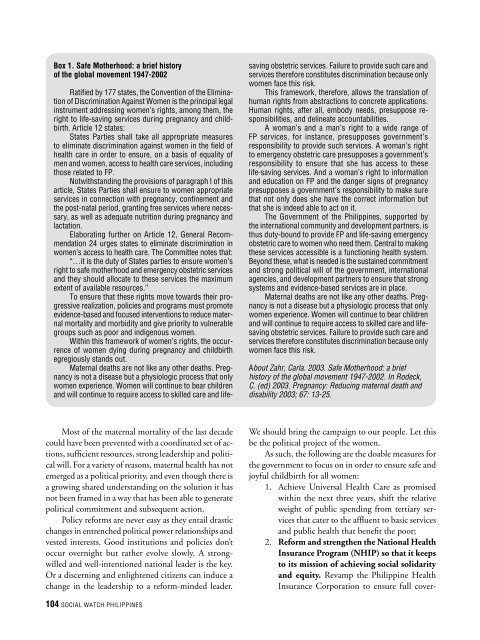Report - Social Watch Philippines
Report - Social Watch Philippines
Report - Social Watch Philippines
Create successful ePaper yourself
Turn your PDF publications into a flip-book with our unique Google optimized e-Paper software.
Box 1. Safe Motherhood: a brief history<br />
of the global movement 1947-2002<br />
Ratifi ed by 177 states, the Convention of the Elimination<br />
of Discrimination Against Women is the principal legal<br />
instrument addressing women’s rights, among them, the<br />
right to life-saving services during pregnancy and childbirth.<br />
Article 12 states:<br />
States Parties shall take all appropriate measures<br />
to eliminate discrimination against women in the fi eld of<br />
health care in order to ensure, on a basis of equality of<br />
men and women, access to health care services, including<br />
those related to FP.<br />
Notwithstanding the provisions of paragraph I of this<br />
article, States Parties shall ensure to women appropriate<br />
services in connection with pregnancy, confi nement and<br />
the post-natal period, granting free services where necessary,<br />
as well as adequate nutrition during pregnancy and<br />
lactation.<br />
Elaborating further on Article 12, General Recommendation<br />
24 urges states to eliminate discrimination in<br />
women’s access to health care. The Committee notes that:<br />
“…it is the duty of States parties to ensure women’s<br />
right to safe motherhood and emergency obstetric services<br />
and they should allocate to these services the maximum<br />
extent of available resources.”<br />
To ensure that these rights move towards their progressive<br />
realization, policies and programs must promote<br />
evidence-based and focused interventions to reduce maternal<br />
mortality and morbidity and give priority to vulnerable<br />
groups such as poor and indigenous women.<br />
Within this framework of women’s rights, the occurrence<br />
of women dying during pregnancy and childbirth<br />
egregiously stands out.<br />
Maternal deaths are not like any other deaths. Pregnancy<br />
is not a disease but a physiologic process that only<br />
women experience. Women will continue to bear children<br />
and will continue to require access to skilled care and life-<br />
Most of the maternal mortality of the last decade<br />
could have been prevented with a coordinated set of actions,<br />
suffi cient resources, strong leadership and political<br />
will. For a variety of reasons, maternal health has not<br />
emerged as a political priority, and even though there is<br />
a growing shared understanding on the solution it has<br />
not been framed in a way that has been able to generate<br />
political commitment and subsequent action.<br />
Policy reforms are never easy as they entail drastic<br />
changes in entrenched political power relationships and<br />
vested interests. Good institutions and policies don’t<br />
occur overnight but rather evolve slowly. A strongwilled<br />
and well-intentioned national leader is the key.<br />
Or a discerning and enlightened citizens can induce a<br />
change in the leadership to a reform-minded leader.<br />
104 SOCIAL WATCH PHILIPPINES<br />
saving obstetric services. Failure to provide such care and<br />
services therefore constitutes discrimination because only<br />
women face this risk.<br />
This framework, therefore, allows the translation of<br />
human rights from abstractions to concrete applications.<br />
Human rights, after all, embody needs, presuppose responsibilities,<br />
and delineate accountabilities.<br />
A woman’s and a man’s right to a wide range of<br />
FP services, for instance, presupposes government’s<br />
responsibility to provide such services. A woman’s right<br />
to emergency obstetric care presupposes a government’s<br />
responsibility to ensure that she has access to these<br />
life-saving services. And a woman’s right to information<br />
and education on FP and the danger signs of pregnancy<br />
presupposes a government’s responsibility to make sure<br />
that not only does she have the correct information but<br />
that she is indeed able to act on it.<br />
The Government of the <strong>Philippines</strong>, supported by<br />
the international community and development partners, is<br />
thus duty-bound to provide FP and life-saving emergency<br />
obstetric care to women who need them. Central to making<br />
these services accessible is a functioning health system.<br />
Beyond these, what is needed is the sustained commitment<br />
and strong political will of the government, international<br />
agencies, and development partners to ensure that strong<br />
systems and evidence-based services are in place.<br />
Maternal deaths are not like any other deaths. Pregnancy<br />
is not a disease but a physiologic process that only<br />
women experience. Women will continue to bear children<br />
and will continue to require access to skilled care and lifesaving<br />
obstetric services. Failure to provide such care and<br />
services therefore constitutes discrimination because only<br />
women face this risk.<br />
About Zahr, Carla. 2003. Safe Motherhood: a brief<br />
history of the global movement 1947-2002. In Rodeck,<br />
C. (ed) 2003. Pregnancy: Reducing maternal death and<br />
disability 2003; 67: 13-25.<br />
We should bring the campaign to our people. Let this<br />
be the political project of the women.<br />
As such, the following are the doable measures for<br />
the government to focus on in order to ensure safe and<br />
joyful childbirth for all women:<br />
1. Achieve Universal Health Care as promised<br />
within the next three years, shift the relative<br />
weight of public spending from tertiary services<br />
that cater to the affl uent to basic services<br />
and public health that benefi t the poor;<br />
2. Reform and strengthen the National Health<br />
Insurance Program (NHIP) so that it keeps<br />
to its mission of achieving social solidarity<br />
and equity. Revamp the Philippine Health<br />
Insurance Corporation to ensure full cover-


